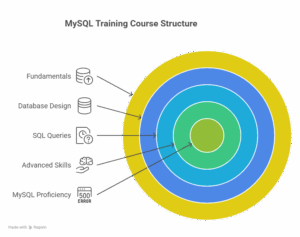In the pulsating heart of modern application stacks, particularly the venerable LAMP (Linux, Apache, MySQL, PHP/Python/Perl) and the burgeoning world of cloud-native deployments, the role of a robust, reliable database is paramount. Amidst a sea of data solutions, MySQL continues to reign supreme, powering countless websites, e-commerce platforms, and enterprise applications globally. Even under Oracle’s stewardship, MySQL maintains its dual appeal: the vibrant open-source Community Edition and the feature-rich Enterprise Edition, offering high-availability solutions like HeatWave and widespread adoption, especially in India’s booming digital economy.
While self-study can provide foundational knowledge, structured Oracle MySQL Training significantly accelerates your learning curve. It transcends the fragmented nature of ad-hoc resources, providing a comprehensive, guided pathway to mastery.
At Elysium Academy, our Core MySQL Training course is meticulously crafted to empower you with in-demand database skills. This blog post will delve into why our Oracle MySQL Training is the definitive choice, highlighting its comprehensive curriculum, extensive hands-on labs, and dedicated career support. If you’re ready to master one of the world’s most popular relational databases and unlock significant career opportunities, Elysium Academy’s Oracle MySQL Training is your strategic starting point.

Who Should Enroll?
Our Core MySQL Training course at Elysium Academy is specifically designed to cater to a diverse audience, ensuring that anyone with an ambition to excel in the data-driven world can benefit.
The target audience for this comprehensive Oracle MySQL Training includes:
- Programmers and Developers: Those building web, mobile, or desktop applications who need to interact with a robust database backend.
- Database Designers: Individuals keen on understanding best practices for creating efficient and scalable database schemas.
- Aspiring DBAs (Database Administrators): Anyone looking to start a career in database management, focusing on MySQL administration, security, and performance.
- Data Analysts: Professionals who need strong SQL skills to extract, transform, and analyze data for business intelligence.
Regarding prerequisites, you’ll be pleased to know that our Oracle MySQL Training requires only basic computer literacy. No prior database experience is necessary, as we cover core fundamentals from scratch. While familiarity with SQL concepts can be helpful, it’s not mandatory. We ensure a foundational understanding for all learners, making this an ideal entry point into database management.
Upon completion, our Core MySQL Training effectively supports various career goals, enabling you to pursue roles in web database development, seamless application integration, and specialized MySQL developer or administrator positions across industries.

Learning Objectives & Outcomes
Elysium Academy’s Core MySQL Training course is designed with clear learning objectives, ensuring that by its completion, you possess both theoretical knowledge and practical proficiency crucial for real-world scenarios.
You will learn to:
- Understand database fundamentals and the relational model: Grasping the core concepts of relational databases, including DDL (Data Definition Language) and DML (Data Manipulation Language), and principles of data modeling.
- Install and configure MySQL server and clients: Gain hands-on experience setting up MySQL environments, using both command-line interface (CLI) tools and the intuitive graphical user interface (GUI) of MySQL Workbench.
- Design normalized schemas using ER modeling: Learn to create efficient and robust database designs, apply normalization rules, and define appropriate constraints and indexes for optimal performance.
- Develop powerful SQL queries: Master essential CRUD (Create, Read, Update, Delete) operations, complex joins, intricate subqueries, powerful aggregations, and built-in functions to extract and manipulate data effectively. This is a cornerstone of our Oracle MySQL Training.
- Work with database objects: Create and manage views, implement triggers for automated actions, develop stored routines (procedures and functions) for complex logic, and understand transaction control for data integrity.
- Perform administration basics: Learn essential tasks like user management, role-based access control, implementing security measures, and performing vital backup and restore operations.
- Master performance tuning: Utilize tools like EXPLAIN plans to analyze query performance, implement effective indexing strategies, and leverage the performance_schema for detailed monitoring.
- Get an introduction to replication and high-availability: Understand concepts of data redundancy and ensuring continuous database operation, including optional exposure to cloud-native MySQL usage.
Beyond technical skills, you’ll achieve vital soft outcomes: gaining invaluable hands-on project experience, preparing thoroughly for job interviews, and developing a compelling resume, all part of our comprehensive Oracle MySQL Training.

Course Structure & Content Breakdown
Elysium Academy oracle MySQL Training is structured into eight comprehensive modules, each meticulously designed to build your expertise progressively. Our Oracle MySQL Training ensures a deep dive into every facet of MySQL, from foundational theories to advanced real-world applications.
Module 1: Fundamentals & Setup
This initial module of our Oracle MySQL Training lays the essential groundwork for your database journey. We begin with a thorough exploration of Relational Database Management System (RDBMS) theory, defining key concepts like tables, rows, columns, and relationships, which are fundamental to understanding any modern database. You’ll gain clarity on the distinct characteristics and ideal use cases of MySQL Community vs. Enterprise editions, understanding the advantages and support models of each. A deep dive into MySQL architecture reveals how the server processes queries, manages storage engines (like InnoDB), and handles connections, providing a holistic view of the database’s internal workings.
The practical component of this module focuses on installing MySQL server and clients across various operating systems, ensuring you can set up your development environment effectively. We’ll explore various MySQL services and support options, familiarizing you with resources available for troubleshooting and optimization. A key part of this Oracle MySQL Training module is the introduction to MySQL Workbench as a GUI tool. You’ll learn to navigate its features, including schema modeling, the robust query editor, and integrated performance monitoring tools, enabling intuitive database interaction from day one.
Module 2: SQL Basics & Data Types
Building on the setup, this module of our Oracle MySQL Training dives into the fundamental building blocks of database interaction: SQL. You’ll gain a solid understanding of data types, which are crucial for defining the nature of information stored in your database. We cover numeric types (e.g., INT, DECIMAL), character types (e.g., VARCHAR, TEXT), temporal types (e.g., DATE, DATETIME, TIMESTAMP), and binary types, along with their respective null semantics.
The core of this module is table creation using DDL (Data Definition Language) commands. You’ll master CREATE TABLE statements, learning how to define columns, specify their data types, and implement essential constraints like NOT NULL, DEFAULT, and CHECK. Critical key concepts in relational design, such as Primary Keys (PK), Foreign Keys (FK), and Unique Keys, are thoroughly explained and practically applied, ensuring data integrity and strong relationships between tables.
Finally, you’ll learn the essential DML (Data Manipulation Language) commands for manipulating data: INSERT (adding new rows), UPDATE (modifying existing data), DELETE (removing rows), and REPLACE (upserting data). An introduction to basic transactions ensures you understand how to group operations for atomicity and reliability, a vital concept in any Oracle MySQL Training.
Module 3: Querying, Joins & Aggregation
This module is the heart of data retrieval in our Oracle MySQL Training. You’ll gain mastery over the SELECT statement, the most frequently used command in SQL. We cover the fundamental syntax, including selecting specific columns, using aliases, and applying various filtering conditions with the WHERE clause. You’ll learn effective sorting techniques with ORDER BY and how to limit results using the LIMIT clause, essential for pagination. We also touch upon SQL modes and their impact on query behavior.
A crucial skill for working with relational databases is understanding joins. This module provides an in-depth exploration of various join types: INNER JOIN (returning matching rows), LEFT JOIN and RIGHT JOIN (for including non-matching rows from one table), CROSS JOIN (producing a Cartesian product), and SELF JOIN (joining a table to itself). Each join type is explained with clear, real-world examples to illustrate its practical application.
Furthermore, you’ll master aggregate functions like COUNT(), SUM(), AVG(), MIN(), and MAX(), and learn how to group results using GROUP BY and filter those groups with HAVING. The module concludes with a comprehensive study of subqueries – nested queries, correlated subqueries, and importantly, how to convert many subqueries into more efficient join operations, a key optimization technique taught in this Oracle MySQL Training module.
Module 4: Views, Triggers & Indexing
This module of our Oracle MySQL Training delves into powerful database objects and optimization techniques that enhance efficiency and automate operations. You’ll learn about Views, which are virtual tables based on the result-set of a SQL query. We cover how to create and use views to simplify complex queries, enforce security by restricting access to certain columns or rows, and manage their updateability versus non-updateable characteristics.
Next, we explore Triggers, a crucial feature for automating database actions. You’ll learn how to define triggers to execute specific SQL statements before or after INSERT, UPDATE, or DELETE operations on a table. We’ll examine practical use cases such as maintaining audit trails, enforcing complex business rules, and ensuring data consistency across tables, along with their potential limitations. Understanding triggers is a core element of effective database management in Oracle MySQL Training.
Finally, this module emphasizes Indexing, a vital aspect of database performance. You’ll learn about different index types like primary key indexes, composite indexes (on multiple columns), and full-text indexes. Crucially, you’ll understand their impact on queries – how indexes can drastically speed up data retrieval. Practical exercises will focus on using EXPLAIN to analyze query execution plans, identifying bottlenecks, and determining where indexes can be most effectively applied to optimize performance, a skill indispensable for any MySQL professional.
Module 5: Stored Routines & Transactions
This module of our Oracle MySQL Training elevates your programming capabilities within the database, focusing on reusable code and data integrity. You’ll learn to develop Procedures and Functions in MySQL’s SQL/PSM (Persistent Stored Module) style. These stored routines allow you to encapsulate complex business logic directly within the database, improving performance and maintainability. You’ll master defining input/output parameters, handling return values for functions, and executing these routines.
The module covers essential programming constructs, including declaring variables, implementing control flow structures like IF-ELSE conditionals, CASE statements, and various LOOP constructs (WHILE, REPEAT, LOOP) for iterative processing. Crucially, we’ll delve into error handling within stored routines using handlers, ensuring your database-side code is robust and gracefully manages exceptions.
A fundamental concept for data consistency in Oracle MySQL Training is Transaction Control. You’ll gain a deep understanding of ACID properties (Atomicity, Consistency, Isolation, Durability), which are the bedrock of reliable database operations. You’ll learn how to use COMMIT to finalize transactions and ROLLBACK to undo changes, ensuring data integrity even in the face of errors. We’ll explore isolation levels (Read Uncommitted, Read Committed, Repeatable Read, Serializable) and their impact on concurrency, and discuss strategies for managing deadlocks and utilizing savepoints for partial rollbacks.
Module 6: Security, Backup & Admin
This module of our Oracle MySQL Training focuses on the critical aspects of database administration: securing your data and ensuring its recoverability. You’ll learn the essential steps for creating users and roles, defining their privileges with granular control, and assigning users to specific roles for streamlined management. Implementing SSL security for client-server connections will be covered to encrypt data in transit, protecting against eavesdropping.
A cornerstone of any DBA’s role is backup and restore. You’ll master various backup strategies, including using command-line utilities like mysqldump and mysqlpump for logical backups. We’ll explore methods for importing and exporting data using CSV files and leveraging MySQL Workbench’s snapshot features for convenient data recovery. Understanding how to restore databases from these backups effectively is a vital skill.
The module also covers essential administration practices, including configuring and interpreting logging (error logs, binary logs, slow query logs) for troubleshooting and auditing. You’ll learn about monitoring tools and how to utilize the performance_schema to identify and diagnose performance bottlenecks. An introduction to Enterprise tools will provide insights into more advanced monitoring and management solutions, solidifying your administrative capabilities through practical exercises in this crucial Oracle MySQL Training module.
Module 7: Replication, High Availability & Project
This advanced module of our Oracle MySQL Training introduces crucial concepts for building scalable and resilient database systems, culminating in a real-world project. You’ll gain an overview of replication types, understanding how data can be copied and synchronized across multiple MySQL servers to improve read performance and provide data redundancy. We’ll specifically delve into Group Replication for high availability and synchronous replication, and also cover traditional master-slave setups.
The module explores strategies for achieving High Availability (HA) and implementing failover mechanisms to ensure continuous database operation even in the event of server failures. You’ll understand how to design systems for read scaling, distributing read operations across multiple replicas to handle high traffic loads. As an optional deep dive, we’ll introduce HeatWave (MySQL’s in-memory query accelerator) and discuss Cloud DB systems (like AWS RDS for MySQL, Azure Database for MySQL, Google Cloud SQL), highlighting their managed service benefits for HA and scalability.
The module culminates in a comprehensive Capstone Project. You’ll apply all the knowledge gained throughout the Oracle MySQL Training to design and implement a real-world system such as an e-commerce platform, an inventory management system, or a content management system. This project typically involves a team-based challenge, requiring you to integrate various modules, optimize queries, and perform a final demo of your fully functional application, showcasing your end-to-end MySQL expertise.
FAQs
- Is prior experience with Oracle database required?
No, prior experience with Oracle database is not required for our Core MySQL Training. While both are relational databases owned by Oracle, MySQL has a different architecture and administration approach. MySQL is generally considered easier to learn for beginners, and our course covers all core fundamentals from scratch. This means you can begin your database journey with MySQL without any prerequisite knowledge of other database systems like Oracle.
- Can I learn SQL with MySQL and still apply it to Oracle or SQL Server?
Yes, absolutely! The ANSI-SQL skills you learn with MySQL are largely transferable to other relational database management systems (RDBMS) like Oracle, SQL Server, PostgreSQL, and SQLite. The core commands for DDL (CREATE, ALTER, DROP), DML (INSERT, UPDATE, DELETE), and querying (SELECT, JOIN, WHERE, GROUP BY, etc.) are standardized. While there might be slightly different syntax or proprietary functions unique to each database, the fundamental logic and concepts remain the same. Many developers and DBAs transition across systems easily once they master the core SQL taught in our Oracle MySQL Training.
- Does the training include hands-on labs or projects?
Absolutely! Hands-on experience is a cornerstone of our Oracle MySQL Training. Each module is complemented with practical exercises that allow you to immediately apply the concepts learned. Furthermore, the course culminates in a final capstone project, where you’ll build a real-world system from the ground up, integrating all your acquired skills. This extensive practical exposure ensures you gain not just theoretical knowledge but also valuable real-world experience.
- Is certification included and how hard is the exam?
Elysium Academy Core MySQL Training is meticulously designed to help prepare you for Oracle’s official MySQL certifications (e.g., Oracle Certified Professional, MySQL Database Administrator or Developer). While the exam fee itself is separate, our curriculum provides all the necessary knowledge and practice. The exams typically include SQL code scenarios and deep topic coverage, requiring both conceptual understanding and practical application. With consistent practice and a strong focus on the real-world tasks covered in our training, you’ll be well-prepared to successfully clear the exams.
- What career support is offered post-training?
Elysium Academy is committed to your career success even after you complete your Oracle MySQL Training. We offer comprehensive career support, including:
- Resume feedback and optimization to highlight your MySQL skills effectively.
- Mock interview practice to boost your confidence and prepare you for technical and HR questions.
- Dedicated job assistance and placement support, leveraging our network to connect you with relevant job opportunities tailored to MySQL developer and administrator roles.
Conclusion
In a data-driven world, mastering a robust database like MySQL sets you apart. Elysium Academy structured oracle MySQL Training empowers you with in-demand skills in SQL, database administration, performance optimization, and project execution, providing a strong foundation for a thriving tech career.
Our commitment goes beyond lectures. You’ll benefit immensely from learning from experienced instructors, engaging in extensive hands-on labs, tackling real-world challenges, and receiving personalized career guidance. This holistic approach ensures you are not just certified, but truly capable.
Don’t let opportunity pass you by. Take the next definitive step towards building invaluable database expertise. We encourage you to enroll in Elysium Academy Oracle MySQL Training today, review the detailed syllabus, and begin your journey to becoming a proficient MySQL professional. Your data-powered future starts here!












